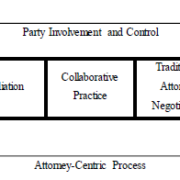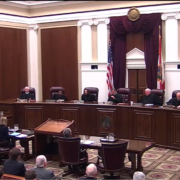Appellate Judges Discuss Collaborative Divorce in Meeting of Hillsborough and Pinellas Family Law Attorneys and Judges
I recently had the opportunity to attend a joint meeting of the Tampa Bay Family Law Inn of Court and Pinellas County’s Canakaris Inn of Court. The guest speakers were three judges from Florida’s Second District Court of Appeals: Chris Altenbernd, Edward C. LaRose, and Robert Morris. I had the opportunity to discuss collaborative divorce with the appellate judges. The following excerpt of a Collaborative Divorce Institute of Tampa Bay article describes a portion of the meeting and my discussions:
Judge Chris Altenbernd (who served as chief judge from 2003-2005) observed that, by the time divorce and paternity cases reach the appellate level, both parties have almost invariably already lost:
“You have families that are being torn apart, and the parties are arguing often for the sake of arguing, not putting children’s issues and the families’ financial future first.”
Judges Edward C. LaRose and Robert Morris agreed.
The Second D.C.A.’s Judge Chris Altenbernd and CDITB Membership Chair Adam B. Cordover Discuss Collaborative Divorce (April 4, 2012)
Judge LaRose then asked the attorneys in the audience whether collaborative practice was being utilized in Pinellas and Hillsborough counties. Collaborative Divorce Institute of Tampa Bay membership chair Adam B. Cordover answered their question. “The practice of collaborative family law is growing in Tampa Bay. Last year, the Collaborative Divorce Institute of Tampa Bay provided training to instruct more attorneys, mental health professionals, and financial experts on how to handle collaborative divorce cases in a way that is private, individually-tailored, respectful, and takes into account the best interests of any children involved. In short, we collaborative professionals are carrying out the ideal of ‘therapeutic jurisprudence.’”
Judge Altenbernd later relayed to Mr. Cordover that he supports the collaborative process, especially in divorce cases where issues of child custody and parenting plans are involved. ”I just think more people need to seriously consider the family-focused process of collaborative divorce rather than fight it out in the court system.”
Attorney Adam B. Cordover has completed advanced training in interdisciplinary collaborative family law. He is on the Board of the Collaborative Divorce Institute of Tampa Bay and is a member of the International Academy of Collaborative Professionals.
If you have questions regarding collaborative divorce and you wish to speak with a Tampa Bay collaborative attorney, contact The Law Firm of Adam B. Cordover, P.A., at (813) 443-0615 or by completing our online form.






It is truly a great and useful piece of info. I’m glad that you shared this useful info with us. Please keep us informed like this. Thanks for sharing.